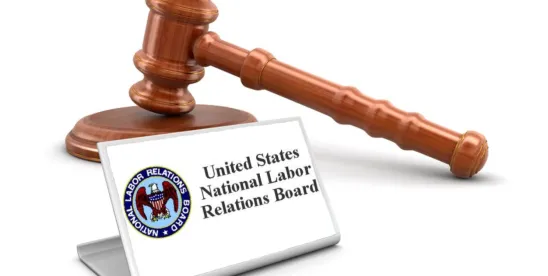Since January 2025, the National Labor Relations Board (NLRB or Board) has lacked a quorum of three Senate-confirmed Members, leaving it unable to decide appeals of administrative law judges’ decisions in unfair labor practice cases and unable to resolve disputed issues in representation case proceedings. Although it has been unable to do so, from a day-to-day perspective, most matters before the agency are proceeding on a business-as-usual basis at the Regional Office level – unfair labor practice charges continue to be investigated and litigated, and representation case petitions continue to be processed, and union elections conducted.
Nonetheless, several states have moved to pass state laws addressing the NLRB’s inability to act. On September 10, 2025, the California Senate approved Assembly Bill 288 (“AB 288”). If signed into law, AB 288 would expand the jurisdiction of California’s Public Employment Relations Board, and would authorize employees of private-sector employers, who ordinarily are subject to the exclusive jurisdiction of the NLRB, to petition the state board for relief when the NLRB lacks a quorum or otherwise lacks the staffing or funding to fulfill its statutory duties. AB 288 would mark an extraordinary departure from 90 years of near-exclusive federal control over private-sector labor relations since the passage of the National Labor Relations Act (NLRA) in 1935.
This development came just days after New York Governor Kathy Hochul signed into New York law similar legislation with A 8590/S 8034 on September 5, 2025, which provides that private sector employees fall within the scope of New York State’s Labor Relations Act unless the NLRB “successfully asserts jurisdiction” via federal court order.
As we previously discussed here, these state actions are not only in response to the NLRB’s loss of a quorum, but also appear to be the result of intense lobbying efforts by labor unions which have raised concerns that, without state action, employees could face challenges in having their federal labor rights enforced, including their ability to organize and join labor unions. With these measures, state legislatures are testing the boundaries of the legal doctrine of preemption.
Broadly stated, the preemption doctrine provides that states may not regulate conduct that is already covered by federal law. In the context of labor law, this means that states cannot have laws to regulate conduct that the NLRA protects, prohibits, or arguably protects or prohibits.
The NLRB already has signaled strong opposition to passage of these state measures. On August 15, 2025, the NLRB’s Acting General Counsel William Cowen issued a statement warning that such state laws would almost certainly be preempted by the NLRA, citing long-established US Supreme Court precedent. Mr. Cowen has further stated that concerns about the NLRB’s ability to carry out its duties are unfounded, noting that the Board continues to operate through its regional offices and that the absence of a quorum has had little practical impact on its enforcement work.
On September 11, 2025, the NLRB’s Office of General Counsel announced that it is preparing to sue to block New York’s law, describing it as a direct attack on the “core jurisdiction” of the Board. A lawsuit is expected to be filed shortly. With similar legislation also pending in Massachusetts (Bill S. 1327), this issue could soon become a multistate battle over the limits of federal preemption in labor law.




 />i
/>i

